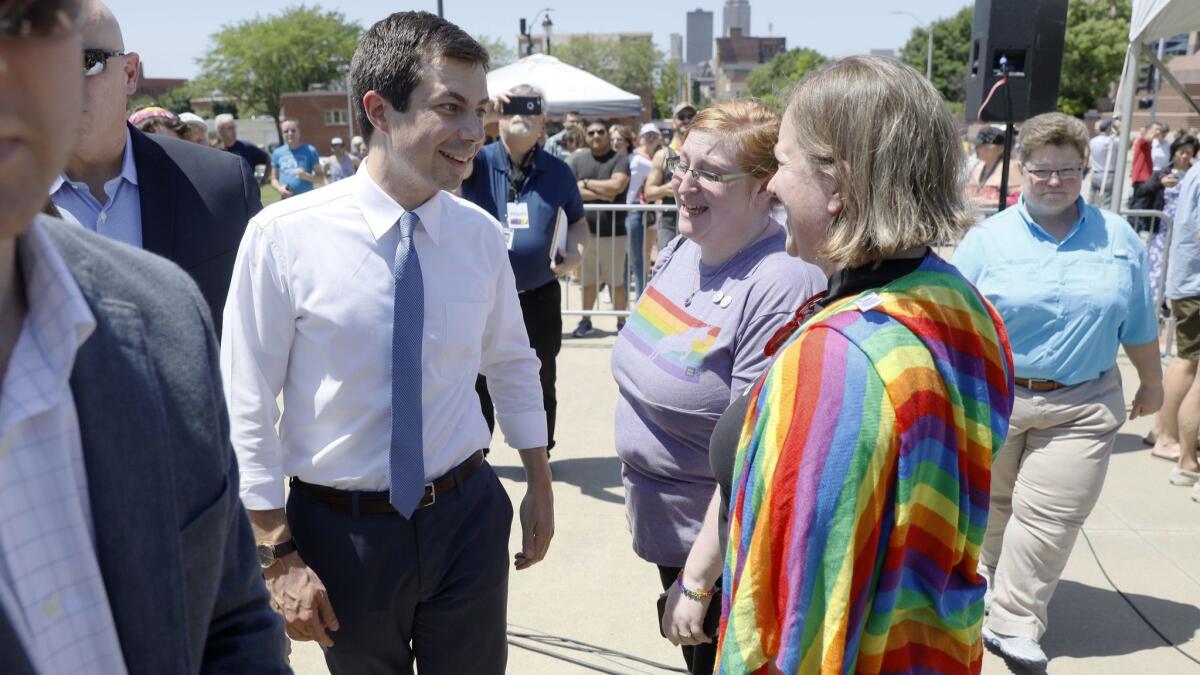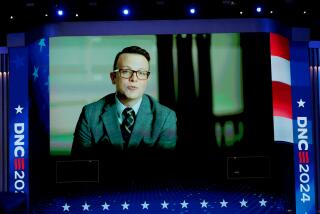Gay voters take pride in Pete Buttigieg’s candidacy, but many question whether he can win

Reporting from Provincetown, Mass. — When same-sex marriage was legalized in Massachusetts in 2004, Mark LeMiere came to Provincetown, a storied gay mecca at the tip of Cape Cod, to tie the knot with his partner of 20 years.
The pair were there again Friday, amazed to be attending a rally for the first serious gay presidential candidate.
“I never in a million years thought we’d be allowed to be married, let alone see an openly gay man run for president,” said LeMiere, 56, who splits his time between Provincetown and Boston.
Win or lose in the 2020 presidential race, Pete Buttigieg, the 37-year-old mayor of South Bend, Ind., is energizing LGBTQ Americans. With his surprisingly strong run for the Democratic presidential nomination, he is helping a long-marginalized community advance in political stature and pride in a way some compare to the effect Barack Obama’s presidency had on African Americans.
“Mayor Pete Buttigieg is transforming America’s perception of LGBTQ people,” said Annise Parker, president of the Victory Fund, an LGBTQ political group that endorsed Buttigieg in June, the first time it had endorsed a presidential candidate.
Buttigieg does not put his sexual orientation at the center of his campaign, but he is not hiding it either. In recent weeks, as his campaign gained prominence, he has made high-profile appearances before predominantly gay audiences.
When he traveled to Provincetown for a campaign event and fundraiser Friday, Buttigieg and his husband, Chasten, received a hero’s welcome from a town that, after the 2010 census, had the highest proportion of same-sex couples in the country.
It was a long way from Iowa, where Buttigieg was heckled by antigay activists this year. In P-town, as the city is known, a popular eatery painted a welcome message to the Buttigiegs in its window. An art gallery displayed an enormous portrait of Buttigieg. He met with students attending a local summer camp for LGBTQ youths. Throngs gathered during a morning stroll through town.
“It felt like our own little parade,” Buttigieg said at an afternoon event where hundreds in the hall — and hundreds more in the overflow crowd outside — waved “PETETOWN’’ signs. “It reminds me of what it is to be in a place that celebrates inclusion, that celebrates belonging.”
Buttigieg and his husband have become the most high-profile gay male couple in America. Images of the pair kissing at campaign events have been broadcast across the country. They have appeared together on the cover of Time magazine.
Asked about potential backlash, Buttigieg cites his experience coming out as gay in the conservative state of Indiana in 2015 just before running for reelection as South Bend mayor.
“I came out not knowing what the consequences would be and, in the end, got reelected with 80% of the vote,” he told reporters in Provincetown. “You have to give people a chance to show they can move beyond prejudice.”
But that could be a risky political bet in a campaign against President Trump. Many of Trump’s supporters are among the 31% of Americans who oppose gay marriage, according to a 2019 Pew Research Center poll, and even some of Buttigieg’s admirers question whether the country will accept a gay man as president.
“Homophobia is a very real thing; however, it is not as visible as racism,” said Damian Archer, a gay African American man at Buttigieg’s Friday rally who is undecided about which candidate to support in 2020.
Rufus Gifford, a gay former Obama administration official, who admires Buttigieg but has not committed to him or any other candidate, says: “I do worry with the stakes as high as they are, I ask myself every day: Is the U.S. ready to elect an openly gay president? I still question it. I’m scared to death we’ll reelect Donald Trump.”
Still, the response to Buttigieg’s candidacy is a remarkable sign of one of the fastest shifts in public attitudes ever measured in the U.S.: the growth in acceptance of homosexuality to the point that, at least among Democratic primary voters, Buttigieg’s orientation has ended up a political asset, not a liability.
Some 61% of Americans support same-sex marriage — double the share in 2004, when only 31% did, according to the Pew Research Center.
Even within the Democratic Party, in 2008, none of the leading presidential candidates supported gay marriage. The ban on gays serving openly in the military ended only in 2011. It was just four years ago, 2015, that the Supreme Court ruled that same-sex marriage could not be banned by states.
“I heard a woman from Alabama call Pete Buttigieg wholesome,” said Richard Holt, a board member of the Victory Fund. “I never thought I’d hear a Bible Belt mother refer to a gay guy as wholesome.”
Buttigieg often appears with his husband. With an active social media presence, Chasten Buttigieg has gained outsize celebrity and embraced the “candidate’s spouse” role with humor and style.
When the pair emerged from a black SUV for a June Victory Fund event in Brooklyn, attendees seemed almost as excited to see the spouse as the candidate.
The event, like the Provincetown visit, was a respite for Buttigieg, who has been battered by criticism for his handling of racial tensions in South Bend after a black man was shot by a white policeman. The fund’s endorsement had been scheduled for earlier in June but was postponed when Buttigieg returned to South Bend to cope with the crisis.
It was rescheduled to a propitious day — the 50th anniversary of the Stonewall uprising, a landmark in the history of the LGBTQ rights movement that occurred after police raided a gay bar in New York City.
“We haven’t seen equality come to the land, not by a long shot, but think about what it means that 50 years after Stonewall, we could be gathered in a room with a top-tier candidate for the American presidency and be in a room with his husband,” Buttigieg said to cheers.
When Fred Karger sought the 2012 Republican nomination as an openly gay candidate, even he conceded victory wasn’t in sight. By contrast, Buttigieg rose implausibly fast in the party’s big 2020 presidential field in part because he is gay.
That fact helped him stand out from the pack and garner media attention, and drew a big infusion of early campaign donations from the LGBTQ community. He went on to raise an impressive $24.8 million in the second quarter, more than any of his rivals have announced so far.
Los Angeles political consultant David Wolf said Buttigieg has received significant fundraising support from Hollywood’s LGBTQ community, including TV producer Ryan Murphy and prominent agents Bryan Lourd and Kevin Huvane.
Buttigieg added to his coffers Friday at the Provincetown fundraiser organized by Bryan Rafanelli, a major Democratic donor who also hosted a Buttigieg event this year at Fenway Park in Boston.
For many Democrats — gay and straight — Buttigieg’s biggest liability is not his sexuality, but that he is too young, too inexperienced or not liberal enough.
“I’m still concerned about his ability to beat Trump,” said Mitchell Katine, a Houston lawyer who helped win a landmark 2003 Supreme Court ruling that decriminalized gay sex. “I want him to be in the running and continue this education process. But he’ll have to convince me he can beat Trump.”
Antigay sentiment is still a powerful force. There are only 20 states where LGBTQ people are protected against discrimination in employment, housing and public accommodations. Just 46% of Republicans say they are open to electing a gay president, an April Quinnipiac University poll found.
Nor does Buttigieg have a monopoly on LGBTQ voters. Former Vice President Joe Biden earned the allegiance of many with his 2012 endorsement of gay marriage — getting out in front of Obama on the issue. Sen. Kamala Harris of California enjoys strong support in San Francisco’s gay community.
A group of 47 LGBTQ activists and elected officials announced their endorsements of Harris last weekend ahead of her participation in the city’s Pride parade.
A June poll of LGBTQ voters by Whitman Insight Strategies and BuzzFeed News found a noteworthy gender gap. Buttigieg was the top choice among Democratic gay men, with 27% saying they were likely to support him.
Among lesbians, however, Buttigieg was fifth choice, with just 13% saying they’d likely support him, behind Harris, Biden and Sens. Bernie Sanders of Vermont and Elizabeth Warren of Massachusetts.
Some lesbians are torn between their interest in Buttigieg and a desire to elect a female president. But Kate Wise, a gay woman from Cleveland who was in New York for the World Pride celebration, said she was all in for Buttigieg from the minute he announced.
“We landed a bro on the top of the pile,” Wise said. But she added, “He would be my guy even if he was not gay.”
Whether he wins the party nomination and goes on to the White House, gay activists hope Buttigieg will help inspire other LGBTQ candidates running up and down the ballot.
“He can have coattails,” Holt said. “We have to have representatives at all levels.”
Times staff writer Tina Daunt contributed to this report.
More to Read
Get the L.A. Times Politics newsletter
Deeply reported insights into legislation, politics and policy from Sacramento, Washington and beyond. In your inbox three times per week.
You may occasionally receive promotional content from the Los Angeles Times.











